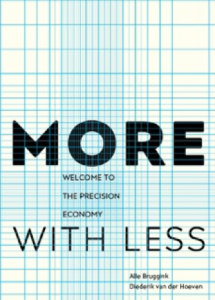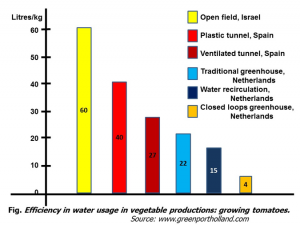Precision is going to have a major effect on the economy; according to Alle  Bruggink and Diederik van der Hoeven in their new book ‘More with Less, Welcome to the Precision Economy’. Precision technology enables companies to make better products: of better quality, producing less waste and less environmental pollution, using less energy, in short: more sustainable. And in man’s use of hardware, a shift is going on towards more efficient use (less idle property): the sharing economy. But precision will also come with its dilemmas, discussed by the authors.
Bruggink and Diederik van der Hoeven in their new book ‘More with Less, Welcome to the Precision Economy’. Precision technology enables companies to make better products: of better quality, producing less waste and less environmental pollution, using less energy, in short: more sustainable. And in man’s use of hardware, a shift is going on towards more efficient use (less idle property): the sharing economy. But precision will also come with its dilemmas, discussed by the authors.
Precision technologies
Precision technologies make headway in many areas. Take agriculture. In precision agriculture, farmers use as little fertilizer, insecticides and pesticides possible, i.e. only if the crop really needs it. They observe the crop all the time: with satellites, with drones or just by plain eyesight. Moreover, they preferably use precision techniques, like predatory mites or parasitoid wasps, instead of toxins. Precision agriculture has high yields and little environmental effect; the basis for solving global food problems. In many other areas, comparable precision techniques are in rapid development: energy (in particular photovoltaics), new special materials (often biobased), smart efficient designs (bridges, tools). Nowadays, biotechnologists can precisely manipulate materials down to the size of single molecules; nature shows them how to do so. In many areas, processes in living nature show the way into precision. Precision allows companies to make more profit and produce less environmental effect, a match of economy and ecology. Precision will conquer the world, the authors give many examples.

Social precision
Precision comes on terms on its own. Precision technologies require dedication from those who apply them. If and when people are harassed for productivity, precision will not bear fruit to their companies. And in statistics, precision may look like economic stagnation: production may go down because smart designs require less materials and less energy use; and because of social changes like car sharing. The authors also discuss the dilemmas that this phenomenon poses. Welcome to the precision economy!
“More with Less” can be ordered at www.bio-based.eu/reports
Biobased Press, based in Amsterdam, publishes books in Dutch and in English; it also publishes a bilingual website: biobasedpress.eu. Its subjects are the biobased economy (the production of products and materials from natural resources), and more generally social and economic development through sustainability and innovation.
On the authors:
Alle Bruggink is a former research director at DSM, and professor emeritus in industrial organic chemistry at Radboud University, Nijmegen.
Diederik van der Hoeven is a science journalist with a background in sustainability.
Earlier, they wrote ‘Green Growth, Towards the Society of 2040’ (in Dutch) (together with the late Paul Reinshagen).
Source
Biobased Press, press release, 2017-05-17.
Share
Renewable Carbon News – Daily Newsletter
Subscribe to our daily email newsletter – the world's leading newsletter on renewable materials and chemicals









